Transport for Greater Manchester
Transport for Greater Manchester (TfGM) is the public body responsible for co-ordinating transport services throughout Greater Manchester in North West England. The organisation traces its origins to the Transport Act 1968, when the SELNEC (South East Lancashire/North East Cheshire) Passenger Transport Executive was established to co-ordinate public transport in and around Manchester. Between 1974 and 2011, it was known as the Greater Manchester Passenger Transport Executive (GMPTE), until a reform of local government in Greater Manchester granted it more powers and prompted a corporate rebranding.[1] The strategies and policies of Transport for Greater Manchester are set by the Greater Manchester Combined Authority and its Greater Manchester Transport Committee.
 | |
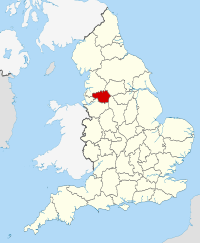 Map showing Greater Manchester, the authority's area of responsibility | |
| Abbreviation | TfGM |
|---|---|
| Predecessor | Greater Manchester Passenger Transport Executive |
| Formation | 2011 |
| Type | Public body |
| Purpose | Transport authority |
| Headquarters | Manchester |
| Location | |
Region served | Greater Manchester parts of Derbyshire, Cheshire & Lancashire |
Chief Executive | Eamonn Boylan |
Parent organisation | Greater Manchester Combined Authority |
Budget | £280 million (2015–16, excluding capital expenditure) |
| Website | www |
Transport for Greater Manchester is responsible for investments in improving transport services and facilities. It is the executive arm of the Greater Manchester Combined Authority which funds and makes policies for TfGM. The authority is made up of 33 councillors appointed from the ten Greater Manchester districts (Bolton, Bury, Manchester, Oldham, Rochdale, Salford, Stockport, Tameside, Trafford and Wigan).
Services

Manchester Metrolink
The Manchester Metrolink light rail system launched in 1992. Entirely subsidised by TfGM without a government grant and operated by KeolisAmey.[2] It carries over 43.7 million passengers a year.[3] With 99 stations it is the largest local transport network in the United Kingdom after the London Underground. Further expansion to Stockport is envisaged.
- Altrincham-Bury line
- Altrincham-Piccadilly line
- Bury-Ashton line
- East Didsbury-Rochdale line
- Eccles- Piccadilly line
- Manchester Airport-Cornbrook line
- MediaCity- Etihad Campus line
- Crumpsall – Trafford Park line
Rail services
Rail services are operated by Avanti West Coast, CrossCountry, East Midlands Railway, Northern, TransPennine Express and Transport for Wales.[4] TfGM subsidise fares on certain local services and fund station refurbishments on an ad hoc basis.
Buses
- Metroshuttle: launched 2002, free bus service around Manchester city centre. New services were provided in Bolton, Oldham and Stockport after success of the service in Manchester.[5]
- Bus services operated by private operators including Arriva North West, Bullocks Coaches, D&G Bus, Diamond Bus North West, First Greater Manchester, First West Yorkshire, Go North West, Manchester Community Transport, Rosso & Stagecoach Manchester[6]
- Maintenance of bus shelters and stations including Shudehill Interchange
- Ring & Ride – An accessible, low-cost minibus service for people who have difficulty in using public transport
Highways and Cycling
- Greater Manchester Urban Traffic Control Unit (GMUTC) – responsibility for road management transferred to TfGM in 2009. Entails installation, maintenance and management of traffic signals, limited areas of road safety (2012), incident response and event management via a traffic control centre.
- Cycling – promotion of the Greater Manchester Cycling Strategy and delivery of Cycle Hubs and regional cycle routes
Fares, ticketing and information
- Subsidised fares on certain services
- System One travelcards
- Get me there
- Public transport maps and timetables
- Website
- Route Explorer application
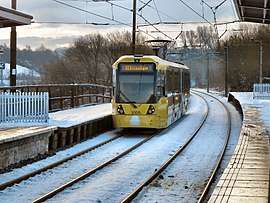
Manchester Metrolink
TfGM owns Greater Manchester's tram system, which includes over 57 miles of track and 93 stops across seven of the ten Greater Manchester boroughs.Metroshuttle
A free bus service around Manchester city centre, Bolton, Oldham and Stockport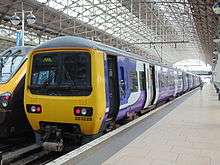
Commuter rail services
TfGM subsidises local rail services and helps to fund station improvements across Greater Manchester.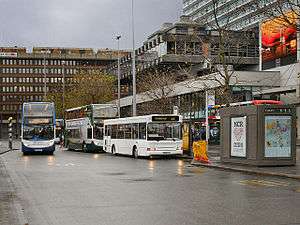
Bus services
TfGM maintains bus shelters, subsidises some fares and implements the System One travelcards.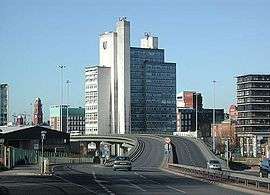
Road management
TfGM is responsible for maintenance of traffic signals.
Transport for Greater Manchester Committee (TfGMC)
TfGM inherited the responsibilities of the Greater Manchester Passenger Transport Executive established in 1974.
On 1 April 2011, the GMPTE became Transport for Greater Manchester (TfGM),[7] a new regional transport body for Greater Manchester[8][9][10] that forms part of the new Greater Manchester Combined Authority (GMCA). As a result, GMITA was abolished,[7] replaced by the Transport for Greater Manchester Committee (TfGMC) which ultimately reports to the Combined Authority. TfGMC and its subcommittees are made up of a nominated pool of 33 councillors from the ten metropolitan boroughs of Greater Manchester who manage TfGM and create transport policy in Greater Manchester.
Although it differs in certain structural forms,[11] on the day of its inauguration TfGM became the second most powerful and influential transport organisation in England after Transport for London because it unites previously splintered governance over transport policy in the boroughs under one body.[12][13] It elects its own Chair and Vice-Chair and assumes the functions previously performed by GMITA as well as the newly devolved transport powers and responsibilities from Government and the 10 Metropolitan Councils which make up the area. The 33 councillors have voting rights on most transport issues despite not being members of the GMCA: major decisions still require approval by the GMCA, but the functions that are referred (but not delegated) to the TfGMC include making recommendations in relation to:
- The budget and transport levy
- Borrowing limit
- Major and strategic transport policies
- The local transport plan
- Operation of Greater Manchester Transport Fund and approval of new schemes
- Appointment of Director General/Chief Executive of TfGM
Corporate identity
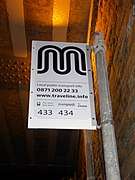
TfGM uses a corporate identity designed in-house. The black and white "M" logo is adapted from the GMPTE logo and is used on bus stops across Greater Manchester.
See also
- Timeline of public passenger transport operations in Manchester
References
- All change: Greater Manchester Passenger Transport Executive becomes Transport for Greater Manchester – with a new logo of course Archived 4 April 2011 at the Wayback Machine Manchester Evening News 1 April 2011
- RATP buys Manchester Metrolink operator Railway Gazette International 2 August 2011
- Light Rail and Tram Statistics: England 2018/19 Department for Transport (Retrieved 26 July 2020)
- Operators Transport for Greater Manchester
- Metroshuttle Archived 2 November 2012 at the Wayback Machine Transport for Greater Manchester
- Bus Operators Transport for Greater Manchester
- "Arrangements for Establishing the Combined Authority" (PDF). Association of Greater Manchester Authorities (AGMA). p. 4. Retrieved 8 February 2011.
- "Draft LTP3 Consultation Proposals". Greater Manchester Integrated Transport Authority (GMITA). p. 9. Retrieved 3 December 2010.
- "City Region Pilot and Governance" (PDF). Manchester City Council. p. 14. Retrieved 3 December 2010.
- "Greater Manchester Local Enterprise Partnership – A Proposal To Government" (PDF). Association of Greater Manchester Authorities (AGMA). p. 18. Retrieved 3 December 2010.
- "City Region Pilot and Governance" (PDF). Manchester City Council. Retrieved 3 December 2010.
- "City Region Governance – Consultation on Future Arrangements for Greater Manchester" (PDF). Wigan Metropolitan Borough Council. Archived from the original (PDF) on 7 March 2012. Retrieved 3 December 2010.
- "Review of City Region Governance in Greater Manchester" (Word). Bolton Metropolitan Borough Council. Retrieved 3 December 2010.
External links


- Official website of Transport for Greater Manchester
- Greater Manchester Integrated Transport Authority
- Greater Manchester Transportation Unit
- SELNEC plans for urban rapid transport
- Greater Manchester Congestion Charge Proposals
- The SELNEC Preservation Society